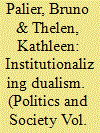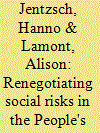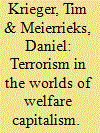|
|
|
Sort Order |
|
|
|
Items / Page
|
|
|
|
|
|
|
| Srl | Item |
| 1 |
ID:
094751


|
|
|
|
|
| Publication |
2010.
|
| Summary/Abstract |
The French and German political economies have been significantly reconfigured over the past two decades. Although the changes have often been more piecemeal than revolutionary, their cumulative effects are profound. The authors characterize the changes that have taken place as involving the institutionalization of new forms of dualism and argue that what gives contemporary developments a different character from the past is that dualism is now explicitly underwritten by state policy. They see this outcome as the culmination of a sequence of developments, beginning in the field of industrial relations, moving into labor market dynamics, and finally finding institutional expression in welfare state reforms. Contrary to theoretical accounts that suggest that institutional complementarities support stability and institutional reproduction, the authors argue that the linkages across these realms have helped to translate employer strategies that originated in the realm of industrial relations into a stable, new, and less egalitarian model with state support.
|
|
|
|
|
|
|
|
|
|
|
|
|
|
|
|
| 2 |
ID:
171714


|
|
|
|
|
| Summary/Abstract |
There have been various attempts to capture the direction of welfare provision in Japan and the People's Republic of China (PRC) as a regionally coherent welfare regime, following on from attempts by the welfare regime literature to categorize nation-states by the characteristics of their welfare provision in the West. However, stark differences between the PRC and Japan as regional neighbours, and even within the regions of each country, pose a challenge to this kind of macro-level theorizing. This special issue seeks to supplement macro perspectives on welfare regimes by exploring a range of welfare policies across both states from an ethnographic, bottom-up perspective, which captures the dynamic nature of welfare and highlights the importance of understanding how local actors request, interpret, and implement risk management strategies. The management of social risks is shown not to have one clear direction determined by, for example, market logic: instead, this special issue highlights the ways in which the burden of risk shifts between family, market, state, and communities unevenly over time, reflecting underlying institutional norms which are always up for negotiation. In doing so, this special issue emphasizes the importance of local, contextualized understandings of welfare, and suggests that the comparative welfare regimes literature should seek the micro-institutional foundations of welfare provision as the basis for comparison.
|
|
|
|
|
|
|
|
|
|
|
|
|
|
|
|
| 3 |
ID:
101684


|
|
|
|
|
| Publication |
2010.
|
| Summary/Abstract |
This contribution argues that social policies ameliorate poor short-run and long-run socioeconomic conditions (e.g., unemployment, poverty, inequality, and dissatisfaction), thereby indirectly reducing terrorist activity. The authors empirically assess the influence of social policies (indicated by social spending and welfare regime variables) on homegrown terrorism for fifteen Western European countries during the 1980-2003 period. The authors find that higher social spending in certain fields (health, unemployment benefits, and active labor market programs) is associated with a significant reduction in homegrown terrorism, while spending in other fields (e.g., public housing) is not. Moderate evidence furthermore indicates that the different worlds of welfare capitalism differently affect homeland terrorism. Social democratic welfare regimes that create low levels of market dependence are on average less prone to domestic terrorist activity. The findings suggest that homegrown terrorism in Western Europe may also be fought by higher spending in certain fields and more generous welfare regimes.
|
|
|
|
|
|
|
|
|
|
|
|
|
|
|
|
|
|
|
|
|